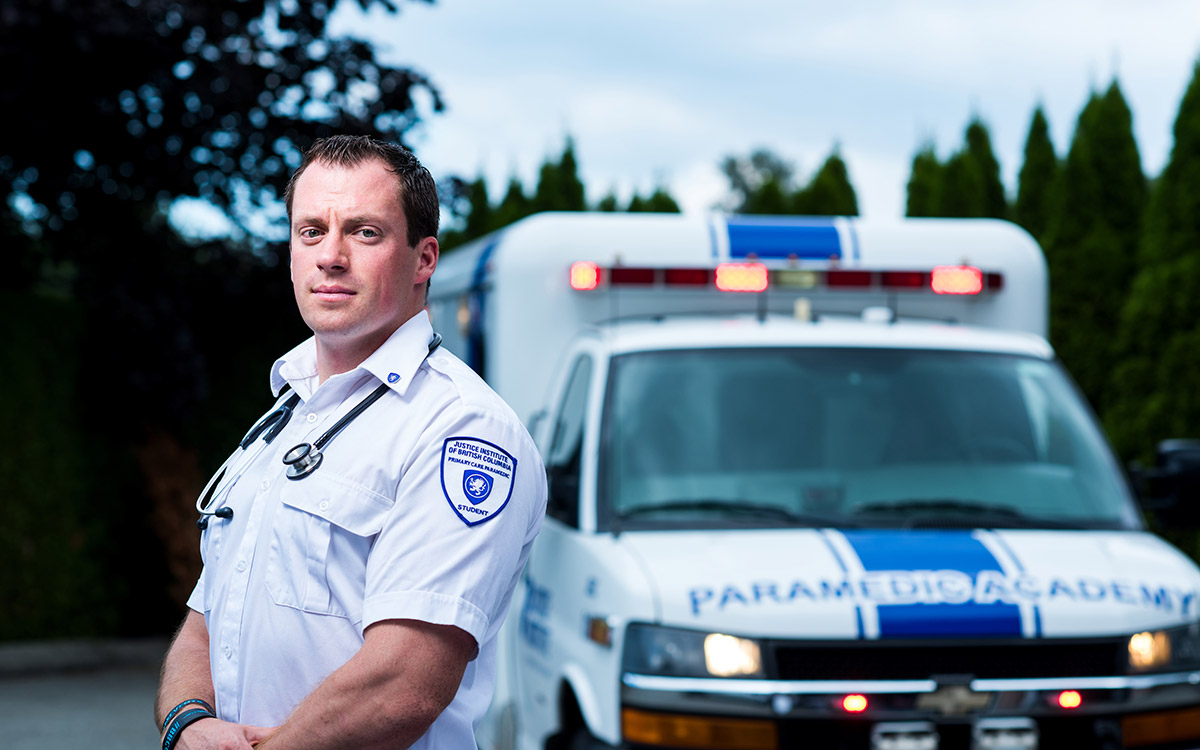Just a week after Matt Anderson successfully completed his paramedic licensing exam he was practically bursting to talk about the possibilities that come with his training at the Justice Institute of British Columbia (JIBC).
After all, as the lone certified paramedic in Moricetown, a Wet'suwet'en village in Central BC halfway between Smithers and Hazelton, he and a licenced Emergency Medical Responder (EMR) were to be the main regular providers of health care to the approximately 800 residents.
It was yet another role in the community for Matt, who is also a high school teacher for at-risk youth, the town’s driving instructor, one of 12 members of its volunteer fire department, and one of only two certified EMRs.
As a first responder, he said, “It’s 24/7. I have a radio on me and I just go when I’m called.”
The town’s fire chief asked him to become the fire department’s “medical guy” because no one else wanted to do it. In a First Nations community, the close knit nature and location can often result in Indigenous firefighters and first responders attending to emergencies involving their own families. This can lead to some uncomfortable situations, unique to a small community. Matt, however, is one of the few non-Indigenous residents, from a family that’s called Moricetown home for almost 40 years.
He agreed to the role, was trained in Occupational First Aid Level 1 and enjoyed it so much he started thinking about becoming a paramedic. He attended JIBC to get his EMR certification and eventually community leaders agreed they wanted him to pursue further training.
I just loved it. I ate that program up ... The instructors in Chilliwack are phenomenal and I hear that from everyone. Really great course
His school supervisor and the fire chief both gave him leaves of absence so he could go through the eight-month process of training for the Primary Care Paramedic Certificate at JIBC’s Chilliwack campus and completing the licensing requirements; the Moricetown Volunteer Fire Department and the Kyah Wiget Education Society he works for helped cover some of the costs; and the Moricetown Band is also behind him.
The JIBC training was everything he’d hoped.
“I just loved it. I ate that program up. I loved the instructors. The instructors in Chilliwack are phenomenal and I hear that from everyone. Really great course.”
His training has been invaluable to residents of his hometown, which is about 20 minutes away from the nearest hospitals in Smithers and Hazelton.
With his EMR training, Matt recalled, he could, for example, help heart attack victims with simple interventions such as providing oxygen, Aspirin and nitro. He knew the proper protocol, basic things like keeping them warm, and positioning them properly.
The paramedic training opened up even more ways he can help. “Now I can start IVs, give certain rescue and reversal drugs that can make a life-saving difference in an emergency, as well as stabilize patients and properly package them for transport.”
By having patients all ready to load into the ambulance, he’s able to significantly reduce the time to get to the nearest hospital, already a minimum 40-minute round trip.
For the small, remote community, it’s a far cry from the reality of the situation before.
“We would not have known what to do. We would just have to phone and wait because there’s nothing. We didn’t even have oxygen, we didn’t even have a defibrillator on the whole reserve up until [a couple years] ago.”
With his JIBC training, Matt wants to help. And he plans to have lots of assistance thanks to additional JIBC training he received that will benefit his community in more ways than one.
Through JIBC, Matt was licensed to be an instructor for the EMR certificate. He hopes to eventually train others to help provide a basic level of medical care to the remote community.
For Matt, what struck him about the training he’s had is what a difference little things can make when someone is in medical distress.
After all, everyone is capable of rendering some assistance regardless of background.
“The kind of care we want to provide there is not rocket science and can save lives and does save lives. The biggest thing is that the kids will walk away saying, ‘I can do this’ and do it and do it well.”
Matt is hoping he can take his medical training several steps further. He recently wrote the Medical College Admission Test (MCAT), and plans to apply to medical school at the University of Northern British Columbia through its rural medicine program. The program aims to address the need for doctors who will live and practice in rural BC.
He learned about it from a fellow JIBC EMR graduate who is now a student in the program.
“It just seems that’s right up my alley,” Matt said, noting that if his goal of becoming a doctor becomes a reality, he still plans to stay in Moricetown.
"My goal is always to be here and do all these things here because this is home for me.”
For more information on paramedic courses and programs, visit JIBC Paramedic Academy.
